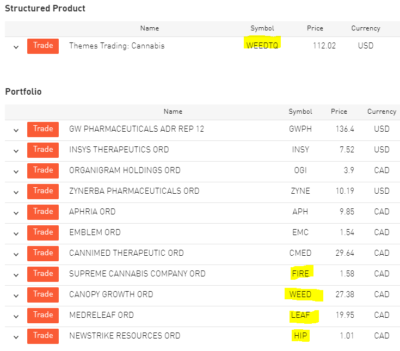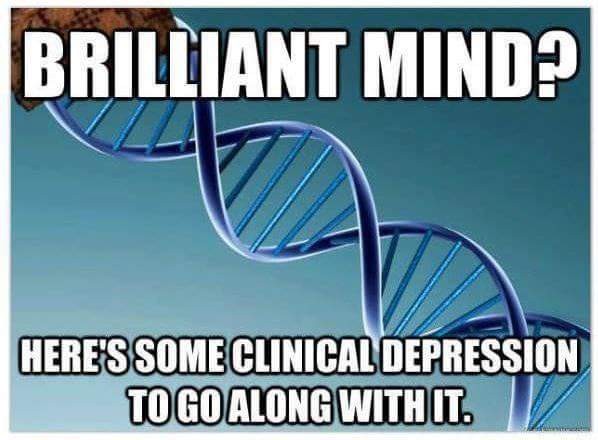Ben wanted to go on the bumber cars. Note, bumber cars, not dodgems. Switzerland is not ruled by a bunch of elf’n’safety pansies. At first, he was all “nooooooooooooooooooooooooo”. After a couple of minutes, he turned into a blood-thirsty maniac who was yelling “HIT HIIIIM! HE LIKES IT!!”
Month: April 2018
How to really make money from drugs
Right all you corner boys. This is how you make money from selling weed now:
Why?
As one of the fastest-growing industries, the cannabis industry is one that should not be forgotten! With sales estimated to reach $75 billion by 2030, cannabis is set to become a very lucrative segment in the years ahead. Taking effect in Canada as early as 2018, the legalization of recreational pot is now a reality – this time supported by real economic fundamentals.What?
This theme encompasses all the possibilities offered by the flourishing cannabis industry, mostly focusing on North American cannabis pure-player firms with high growth potential. Ranging from early-stage production and distribution to final consumption for personal and medical use (i.e. medicines, pain relief, cancer treatment, etc.), our cannabis certificate provides full coverage of the marijuana industry, allowing for the highest expected returns.
I also love how people think they’re being cute with the stock ticker symbols.
Excusez-moi, this is my space
Happy DNA day
Riffs on the Back Catalog

You must be logged in to be able to see this content.
Tulips in Morges, 2018
‘High-Functioning’ depression
This post was written more than 3 years ago and is still just as relevant now as it was then. Normally, I don’t really talk about my mental health, but I feel like this is one of those times when I need to. I feel like I’m swimming against the current. I do not see my depression getting better. I’m functional, barely. I am always tired. I have trouble concentrating. I feel that I am always anxious or angry and I’m not getting the help I need.
I came across this article today, and I’m going to copypasta some bits here. I originally wasn’t going to post this as a public post, but seriously, if you’re like me and are running a mental checklist when reading this article, you need to do something about it. I’m trying to.
If I were to ask you to picture and describe a depressed person, what would you envision?
Someone having trouble getting out of bed every day? Someone who’s calling into work sick because they can’t leave the house? Someone who’s isolated from friends and possibly sleeping 10 or 12 hours a day? Someone who can’t stop crying and who’s feeling hopeless?
Or would you envision a popular, college-educated professional living it up in the big city with a great job, a good group of friends and a long list of accolades to his name, but who wakes up each morning with a gripping sense of anxiety and an internalized pressure to continue to be “perfect” and “keep it all together?”
And would you picture that smiling, competent, friendly coworker of yours who always seems to be getting All The Things done but who secretly, inwardly feels like he’s a complete failure and fears time is flying by and he’s wasting it every day?
Let’s face it: you’re probably not going to picture these folks. And yet each of them could be a perfect example of someone dealing with what’s come to be known as “high-functioning depression.”
While high-functioning depression doesn’t look like the stereotype of depression most of us hold in our heads, this diagnosis nevertheless carries significant risks if left untreated. But the uniquely tricky thing about high-functioning depression is that it’s hard to spot precisely because the people dealing with it look, from the outside, like they’re holding it all together.
In my opinion as a psychotherapist, high-functioning depression is a pop psychology term for what’s clinically known as dysthymia.
Dysthymia, according to the “Diagnostic And Statistical Manual of Mental Disorders 5th Edition” (DSM 5), is a mental health disorder characterized by:
“Depressed mood for most of the day, for more days than not, as indicated by either subjective account or observation by others, for at least two years,” and includes the presence of two or more of the following symptoms, “Poor appetite or overeating; insomnia or hypersomnia; low energy or fatigue; low self-esteem; poor concentration or difficulty making decisions; feelings of hopelessness.”
And yet, while these symptoms may look diagnostically similar to the symptoms we think of when we envision major depressive disorder (MDD), individuals dealing with dysthymia may not have the same severe levels of impaired biological and mental functioning that can make major depression easier and more obvious to spot.
In other words, someone struggling with dysthymia may still be able to get up and go to their demanding, prestigious job, be in a romantic relationship, post the believable smiley photos on Instagram, regularly get together with their friends for happy hour and generally handle all the logistical adulting stuff of their life — passing for someone who doesn’t “look depressed.”
But inwardly, this same person may be gripped with a challenging set of symptoms invisible to those of us who love and know them.
Symptoms that may greatly diminish their overall quality of life, their career, their relationships, and bloom into more challenging mental health concerns if left untreated.
11 Real-Life Ways High-Functioning Depression Can Manifest
Above, I provided you with what the DSM-5’s clinically indicative dysthymic symptoms. Now let’s talk, in layman’s terms, about 11 ways that some of these symptoms may manifest in your real life.
1. Difficulty experiencing joy. [RC: Check!]
With high-functioning depression, the things that used to bring you pleasure don’t bring you joy anymore. They may feel like burdens or events you want to avoid because it feels like more of an effort than a support.
2. Relentless criticality — of self and others. [RC: Check!]
You may have a relentless and invasive internal narrative that’s critical of yourself, of others and of the world in general. You think you’re a failure, you think your boss is an idiot, your partner’s the most irritating person to have ever lived, and life’s just one big slog. This chronically negative thought pattern may feel like something you just can’t turn off.
3. Constant self-doubt. [RC: Check!]
You may constantly doubt whether or not you’re on the right career path, whether you’re in the right relationship, doubt what you’re doing with your life and if you can even handle being an adult. This pattern of constant self-doubt may be situational or pervasive but it’s something that feels like you just can’t get over.
4. Diminished energy. [RC: Check!]
If it feels like getting through each day is like walking up a mountain with a backpack of rocks, if you feel like you barely have the mental, emotional and physical energy to handle your life anymore, if your overall energy levels are greatly diminished, this could be a sign of high-functioning depression.
5. Irritability or excessive anger. [RC: Check!]
If you find yourself blowing up over small things — your partner says something wrong, your co-worker messed up a project, your kid just broke your favorite coffee mug, if you find yourself exploding in a way that feels disproportionate to the event, if irritability and excessive anger are something you’re wrestling with, this may be a sign.
6. Small things feel like huge things.
Similarly, if you find yourself feeling overwhelmed or greatly stressed by an event that happens that maybe wouldn’t have felt like such a huge deal in the past (a friend cancels weekend plans, the grocery bags break when you’re carrying them in, your darn trackpad stops working because you spilled some coffee on it) and it feels like the End Of The World instead of the annoyance that it is — if you find your stress responses disproportionate to the event itself, this may well be a sign of high-functioning depression.
7. Feelings of guilt and worry over the past and the future.
You worry that you chose the wrong career in college, you question whether you’re in the right grad school program, you worry about paying off all those student loans, you worry that you married the wrong partner, you worry about who’s going to care for your folks when they get older, etc. We all have these worries from time to time, but if feelings of guilt and worry over your past and future feel pervasive and dominant, this may be more than “normal” worry.
8. Relying on your coping strategies more and more. [RC: Fuck yes! Hello phone, my old friend…. Check!!]
If you find yourself needing extensive zone-out time after work and on the weekends, turning towards your coping mechanisms more often than not — such as substances or behaviors like using alcohol, drugs, excessive gaming, constant Netflix, etc. — all in an effort to escape your life, this could speak to underlying depression.
9. Generalized sadness. [RC: Oh yes, Check!]
If you find yourself feeling a generalized sense of sadness you can’t seem to pinpoint the cause of, if you drop your mask and armors of smiling competency when you close your door behind you, if you feel a subtle sense of hopelessness, this could speak to high-functioning depression.
10. Seeking perfection.
This one’s a tough one. In a way our society condones perfectionism — getting good grades, getting into the Ivies, landing that amazing tech job, striving, striving, striving. But perfectionism has a shadow side where striving turns into unrealistic demands of yourself and psychologically beating yourself up when you fall short of the bar you set for yourself. If you find yourself doing this and it’s causing you distress, be curious about whether this a sign of high-functioning depression.
11. Inability to rest and slow down.
If you need to clean up, tidy and organize the house after you arrive home from an exhausting day of work before you even consider letting yourself rest, if you find yourself uncomfortable with slowness, stillness and fallow periods of time because of the uncomfortable thoughts and feelings you come into contact with when you do actually slow down, this could be a sign of high-functioning depression.
Mental health struggles come in all shapes and sizes but, as we undo the stigmatization and globalization of mental health scripted over these past few decades, most of us likely still have an unconscious image in our heads of what a depressed person looks like. And while this internalized image of someone who can’t get out of bed, who can’t hold down a job, and who has constant suicidal ideations may be one form of depression, it doesn’t mean that someone who sees themselves in the list above or in the clinical descriptor of dysthymia isn’t also dealing with depression.
But these folks may not be willing to see themselves as depressed. And this can be a big problem. Because, in my clinical opinion, there’s a unique set of risks to being someone with high-functioning depression.
First, because you’re still “holding it all together” it may make it harder for both you and others to spot the very real mental and emotional strain you may be under because you pass. You fly under the radar. You and those around you doubt the seriousness of what you may internally wrestle with because, after all, your life still looks pretty great from the outside, right?
Second, as someone who is high-functioning, you may grow up believing that with enough effort and willpower, you can achieve, gain or fix anything that life throws at you. Not so with high-functioning depression.
High-functioning depression isn’t just a bad attitude, and you can’t just “will your way” out of it. High-functioning depression is a biological and psychological disorder that requires adequate and clinically appropriate treatment. Arguably, the more you push and “will yourself out of it” instead of seeking proper support, the worse your symptoms may get.
For example, if left untreated, high-functioning depression, or dysthymia, can potentially bloom into major depression or major depressive episodes where your biological and psychological functioning is more severely impaired.
Or, perhaps in your attempts to deal with your high-functioning depression on your own, comorbid disorders – such as eating disorders or substance use disorders – can develop from your attempts to manage your intolerable feeling states.
Bottom line: Dysthymia, or high-functioning depression, requires adequate clinical treatment as much as the most stereotyped version of major depression does. And the good news is that with proper clinical treatment, dysthymia can be managed.
[recipe] Ultimate list of pasta shapes and associated sauces
Coups de coeur Divinum
Stand out wines from this year’s Divinum:
We’ve already put an order in for a case of S’escusu, but we’re debating between the rest.
Volunteering, part II
Another evening on the logistics team at Divinum. This was the last evening of the salon, so things started out slowly but went crazy just after the doors closed, with all the glasses coming in for washing. Just a couple of thousand, really.
During my break, I went to spit check some of the wines that stood out from out 5 hour tasting session from yesterday. Some of them went from fantastic to meh, OK, but a few still stood out and deserve further attention.
At one point, near the end, all the exhibitors came in to empty their open bottles. We were aghast at seeing perfectly good wine being dumped down the drain, so we kindly asked them to… just leave the bottles on the table on their way out. In the end, all the volunteers had their pick of about 40 bottles.
I’m going to put my name in the hat to volunteer again next year :)


















